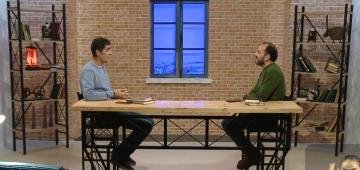 |
Ruben Hakhverdyan: song and poetryWhat artistic and poetic features do the lyrics of Ruben Hakhverdyan's songs have, what thematic directions do they have, can we consider those lyrics poems and why? Literary critics Hayk Hambardzumyan and Arkmenik Nikoghosyan discuss the topic on the "Parallel Readings" program. |
 |
What to read: must-read lists“What to read?”: When answering this question, people more often rely on lists compiled by famous universities, libraries, publishing houses, websites, and famous people. Are these lists truly impartial, or do they reflect the tastes, interests, and influence of certain groups? To what extent can we trust these lists, and how do they shape reading perceptions and the quality of literature? Literary critics Hayk Hambardzumyan and Arkmenik Nikoghosyan discuss the program “Parallel Readings.” |
 |
Garegin Srvandzdyants-185The 185th anniversary of the birth of the founder of Armenian philology and ethnography, the great Armenian folklorist and philologist Garegin Srvandztyants has been celebrated. The materials and studies written by Srvandztyants have been of great importance in the recognition and popularization of our folk culture, and the awakening of the national spirit. The activities, notes, and studies of the great philologist are discussed in the program "Parallel Readings" by literary critics Hayk Hambardzumyan and Arkmenik Nikoghosyan. |
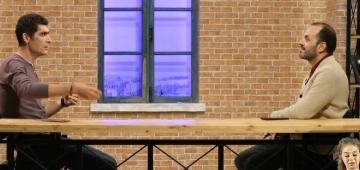 |
About one story: Hrant Matevosyan, "The Dogs"Hrant Matevosyan's story "Dogs" is among his "youthful" works and is somewhat different from the other famous works of the Armenian prose master. The writer uses remarkable stylistic devices here, makes subtle references to other works of Armenian and world literature. Hrant Matevosyan's story "Dogs" is discussed on the "Parallel Readings" program by literary critics Hayk Hambardzumyan and Arkmenik Nikoghosyan. |
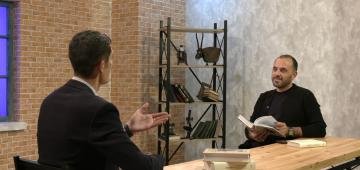 |
Avetik Isahakyan's loves and romanceWhen talking about Avetik Isahakyan's love poetry, the image of the poet's youthful love, Shushanik, is traditionally emphasized, but there were other sources of inspiration in Isahakyan's life as well. Isahakyan's large-scale letters, especially published in recent years, provide an opportunity to see more clearly the path from emotion to poetry and the real addressees of those poems. In the framework of the "Parallel Readings" program, literary critics Hayk Hambardzumyan and Arkmenik Nikoghosyan discuss these issues. |
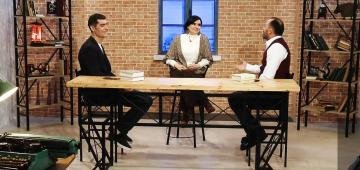 |
Voice and speech in spiritual songs, part 2Spiritual songs are of a general nature, as they are based on the original texts of the Holy Scriptures and are associated with certain holidays and rituals. In this case, where is their originality, authorial or national uniqueness? How does Armenian express the unity of sound, speech and ritual, what do spiritual songs inspire in the believer or listener, and what means do they use? These questions are discussed in the “Parallel Readings” program by literary critics Hayk Hambardzumyan, Arkmenik Nikoghosyan, and musicologist Arusyak Tamrazyan. |
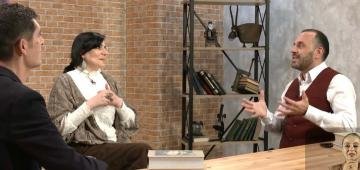 |
Voice and speech in spiritual songs, part 1Armenian medieval spiritual music - hymns, spiritual songs, created as components of ritual, are unique prayers, where words and melody, ritual and artistic, authorial and universal are combined. How did our hymn writers achieve such a striking harmony? Literary critics Hayk Hambardzumyan, Arkmenik Nikoghosyan, and musicologist Arusyak Tamrazyan discuss these issues in the program "Parallel Readings". |
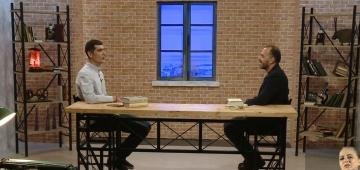 |
The Translation of the "Book of Books" and Armenian Medieval LiteratureAlthough the Armenian people had a rich folklore even before the invention of writing, Armenian literature essentially began with the invention of writing and the translation of the Bible. How did the translation of the Bible affect the development of Armenian medieval literature, and how was the Armenian written artistic tradition formed? Literary scholars Hayk Hambardzumyan and Arkmenik Nikoghosyan discuss these issues in the program "Parallel Readings." |
 |
The charm of the Hamastegh's proseHamastegh's literature is one of those exceptional works that was warmly received both in the Diaspora and in Soviet Armenia. And the reason for this was absolutely not that Hamastegh's prose did not have any ideological accents that were unacceptable or not native to either side. The secret lies in the depth of his literature, high artistry, and most importantly, a unique, sometimes inexplicable charm. Literary critics Hayk Hambardzumyan and Arkmenik Nikoghosyan talk about the writer's prose in the "Parallel Readings" program. |
 |
Literature in one minuteTimes are changing, technologies are developing, even artificial intelligence is creating. Reader expectations are changing, the ways literature is presented and popularized are changing. How do literary critics respond to all this, how is it possible to present literature in one minute? Literary critics Hayk Hambardzumyan, Arkmenik Nikoghosyan, and writer and literary critic Jessah are interviewed on the “Parallel Readings” program. |
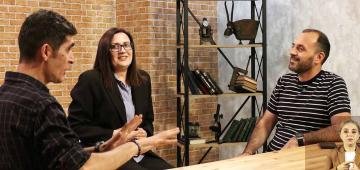 |
Complete Hakob Oshakan: issues and solutionsBoth during the Soviet years and during the period of independence, Hakob Oshakan's books were rarely published in Armenia. The "Diaspora" scientific and educational center has undertaken the publication of his complete works. Two volumes have already been published. Literary critics Hayk Hambardzumyan, Arkmenik Nikoghosyan and Knarik Abrahamyan talk about Hakob Oshakan's literature and this initiative in the "Parallel Readings" program. |
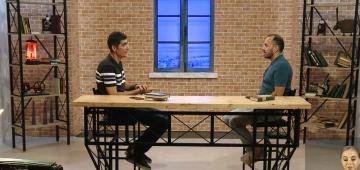 |
Vardan Grigoryan's historical novels and the modernity of the genreSeptember 5 marks the 75th anniversary of the talented historical novelist Vardan Grigoryan. He lived only 38 years, but his historical novels “Eternal Return”, “The Century of Destruction” and especially “Manya Ayrk” changed the description of the genre in our country and determined its further developments. What innovations did he bring and are his historical novels and the genre in general relevant? These questions are discussed in the “Parallel Readings” program with literary critics Hayk Hambardzumyan and Arkmenik Nikoghosyan. |
